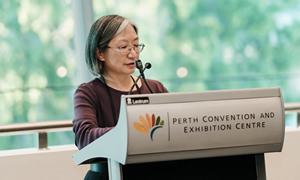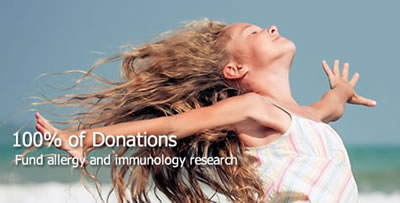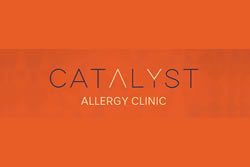AIFA opens research grant round for 2020
 5 March 2020:
5 March 2020:
AIFA announce that research grant round for 2020 is now open.
Due to the continued support from generous donors and sponsors, a total of $110,000 will be granted to immunology and allergy research in 2020.
- $40,000 - AIFA Food Allergy Research Grant
- $30,000 - AIFA Allergy (other than food allergy) or Autoimmunity Research Grant
- $15,000 - AIFA Primary Immunodeficiencies Clinical Research Grant(supported by CSL Behring)
- $15,000 - AIFA Hereditary Angioedema Clinical Research Grant (supported by CSL Behring)
- $10,000 - AIFA Food Allergy Research Grant (supported by DBV Technologies)
AIFA Expression of Interest forms are on the AIFA website www.allergyimmunology.org.au/grants
Grants are awarded on merit, with preference for early stage projects and early career researchers. Criteria for rating grant applications are: originality and scientific quality, significance of outcomes, research methodology, team quality and capability.
Why is medical research important?
When you support medical research, you are helping to build the future of medicine, to advance medical knowledge, improve patient care and save lives.
Australia and New Zealand have a proud history of donating to medical research. The high quality of medical care we enjoy today is built upon decades of quality research. This has resulted in breakthrough treatments and the prevention of life-threatening diseases. It is vital work because what we learn about the immune system now will help fight a wide range of human illness in the future.
There is still so much work to be done.
It is our goal to give a total of more than $500,000 in grants by 2023.
To achieve this, we ensure that 100% of donations directly fund AIFA grants. There are no expensive marketing campaigns and all of our administration costs are supported by ASCIA.


 16 October 2019
16 October 2019 The AIFA Food Allergy Research Grant of $40,000 was awarded to Dr Sidonia Eckle who will study how mucosal-associated invariant T (MAIT) cells affect food allergies. Dr Eckle works at the Peter Doherty Institute for Infection and Immunity, University of Melbourne.
The AIFA Food Allergy Research Grant of $40,000 was awarded to Dr Sidonia Eckle who will study how mucosal-associated invariant T (MAIT) cells affect food allergies. Dr Eckle works at the Peter Doherty Institute for Infection and Immunity, University of Melbourne.  The AIFA Food Allergy Research Grant of $10,000 (supported by DBV Technologies) was awarded to Dr Rachel Peters for her research: “Does the resolution of vitamin D deficiency in food allergic infants predict the resolution of food allergy?” Dr Peters works at the Murdoch Children’s Research Institute, Melbourne.
The AIFA Food Allergy Research Grant of $10,000 (supported by DBV Technologies) was awarded to Dr Rachel Peters for her research: “Does the resolution of vitamin D deficiency in food allergic infants predict the resolution of food allergy?” Dr Peters works at the Murdoch Children’s Research Institute, Melbourne.  In celebration of ASCIA’s 30th Anniversary, AIFA awarded a $30,000 grant to Dr Jason Trubiano, to help establish the Australian Registry of Severe Cutaneous Adverse Reactions (AUS-SCAR) for severe drug allergy. Dr Trubiano is based at Austin Health in Melbourne.
In celebration of ASCIA’s 30th Anniversary, AIFA awarded a $30,000 grant to Dr Jason Trubiano, to help establish the Australian Registry of Severe Cutaneous Adverse Reactions (AUS-SCAR) for severe drug allergy. Dr Trubiano is based at Austin Health in Melbourne.  We are excited to announce that the first AIFA Primary Immunodeficiency Clinical Research Grant of $25,000 (supported by CSL Behring), was awarded to Dr Tri Giang Phan at the Garvan Institute, Sydney. Dr Phan will be using machine-learning to improve the diagnosis of Primary Immunodeficiency Diseases.
We are excited to announce that the first AIFA Primary Immunodeficiency Clinical Research Grant of $25,000 (supported by CSL Behring), was awarded to Dr Tri Giang Phan at the Garvan Institute, Sydney. Dr Phan will be using machine-learning to improve the diagnosis of Primary Immunodeficiency Diseases.  Another new initiative is the AIFA Hereditary Angioedema Clinical Research Grant of $15,000 (supported by CSL Behring). Dr Samantha Chan is the first recipient of this grant, and her project is “Improving the diagnostic utility of next-generation sequencing in Hereditary Angioedema”. Dr Chan is part of a team based at the Walter and Eliza Hall Institute of Medical Research.
Another new initiative is the AIFA Hereditary Angioedema Clinical Research Grant of $15,000 (supported by CSL Behring). Dr Samantha Chan is the first recipient of this grant, and her project is “Improving the diagnostic utility of next-generation sequencing in Hereditary Angioedema”. Dr Chan is part of a team based at the Walter and Eliza Hall Institute of Medical Research.  11 June 2019
11 June 2019 If you missed watching the Catalyst allergy program on ABC TV last night (12 February 2019), you can watch it on ABC iview
If you missed watching the Catalyst allergy program on ABC TV last night (12 February 2019), you can watch it on ABC iview  Local AusPollen Apps provide daily levels of pollen in the air, which can help if you have hay fever (allergic rhinitis) or if your asthma is made worse by allergens in the air. The Apps are available at www.pollenforecast.com.au
Local AusPollen Apps provide daily levels of pollen in the air, which can help if you have hay fever (allergic rhinitis) or if your asthma is made worse by allergens in the air. The Apps are available at www.pollenforecast.com.au The Allergy and Immunology Foundation of Australasia (AIFA) is pleased to announce that the 2018 AIFA research grant has been awarded to Dr Md. Ashik Ullah of the QIMR Berghofer Medical Research Institute in Brisbane.
The Allergy and Immunology Foundation of Australasia (AIFA) is pleased to announce that the 2018 AIFA research grant has been awarded to Dr Md. Ashik Ullah of the QIMR Berghofer Medical Research Institute in Brisbane.